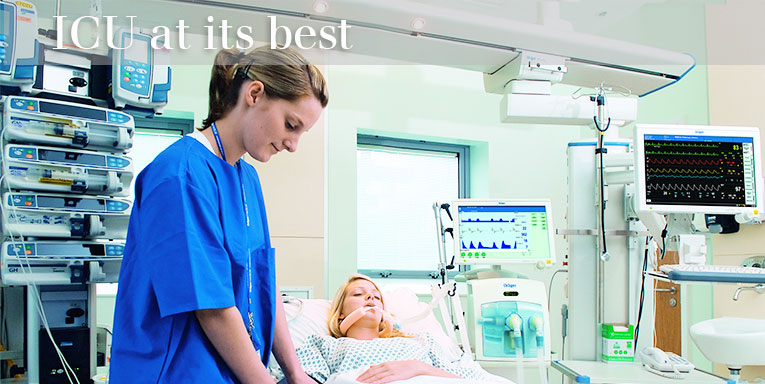Intensive care unit (ICU) in India
What is ICU ?
An intensive care unit (ICU), also known as an intensive therapy unit or intensive treatment unit (ITU) or critical care unit (CCU), is a special department of a hospital or health care facility that provides intensive treatment medicine.
Intensive care units cater to patients with severe and life-threatening illnesses and injuries, which require constant, close monitoring and support from specialist equipment and medications in order to ensure normal bodily functions. They are staffed by highly trained doctors and nurses who specialise in caring for critically ill patients. ICUs are also distinguished from normal hospital wards by a higher staff-to-patient ratio and access to advanced medical resources and equipment that is not routinely available elsewhere. Common conditions that are treated within ICUs include ARDS, trauma, multiple organ failure and sepsis.
Patients may be transferred directly to an intensive care unit from an emergency department if required, or from a ward if they rapidly deteriorate, or immediately after surgery if the surgery is very invasive and the patient is at high risk of complications.
Specialities
Hospitals may have ICUs that cater to a specific medical speciality or patient, such as those listed below:
Neonatal intensive care unit (NICU). This specialty unit cares for neonatal patients who have not left the hospital after birth. Common conditions cared for include prematurity and associated complications, congenital disorders such as Congenital diaphragmatic hernia, or complications resulting from the birthing process.
Psychiatric intensive care unit (PICU). Patients who may voluntarily harm themselves are delivered here so they can be monitored more vigorously. Patient rooms are locked, preventing escaping.
Coronary care unit (CCU): Also known as Cardiac Intensive Care Unit (CICU) or Cardiovascular Intensive Care Unit (CVICU), this ICU caters to patients specifically with congenital heart defects or life-threatening acute conditions such as cardiac arrest.
Trauma intensive care unit (Trauma ICU). These are found only in hospitals certified in Trauma and have a dedicated Trauma Emergency Department equipped with a team of surgeons, nurses, respiratory therapists, and radiological staff.
Surgical Intensive Care Unit (SICU): A specialized service in larger hospitals that provides inpatient care for critically ill patients on surgical services. As opposed to other ICUs, the care is managed by surgeons trained in critical-care.
ICU

Equipment and systems
Common equipment in an ICU includes mechanical ventilators to assist breathing through an endotracheal tube or a tracheostomy tube; cardiac monitors including those with telemetry; external pacemakers; defibrillators; dialysis equipment for renal problems; equipment for the constant monitoring of bodily functions; a web of intravenous lines, feeding tubes, nasogastric tubes, suction pumps, drains, and catheters; and a wide array of drugs to treat the primary condition(s) of hospitalization. Medically induced comas, analgesics, and induced sedation are common ICU tools needed and used to reduce pain and prevent secondary infections.
Quality of care
The available data suggests a relation between ICU volume and quality of care for mechanically ventilated patients.[9] After adjustment for severity of illnesses, demographic variables, and characteristics of different ICUs (including staffing by intensivists), higher ICU staffing was significantly associated with lower ICU and hospital mortality rates. A ratio of 2 patients to 1 nurse is recommended for a medical ICU, which contrasts to the ratio of 4:1 or 5:1 typically seen on medical floors.